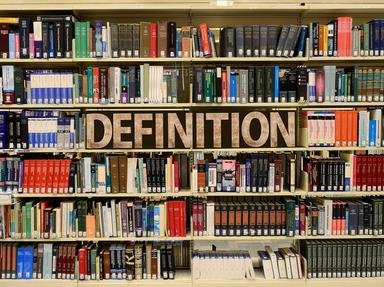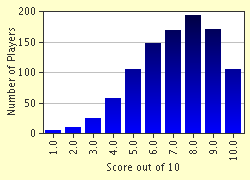Quiz Answer Key and Fun Facts
1. Two words that may easily be confused based on their close spellings are 'ingenious' and 'ingenuous'. The word 'ingenious' is an adjective meaning 'clever' or 'inventive'. Which of the following is the closest in definition to the word 'ingenuous'?
2. The words 'complaisant' and 'complacent' are often confused in both writing and speaking. The word 'complacent' refers to 'a smug sense of self satisfaction', but what is the proper definition for its homophone 'complaisant'?
3. One of the most common errors I encounter in both printed and spoken English is a confusion between the words 'flout' and 'flaunt'. Which of the two words, if either, has the primary meaning of 'openly disregarding' something?
4. The words 'compliment' and 'complement' are homophones, and to make matters worse, their spellings are only separated by a single letter. Compliment is the more commonly used word, meaning 'an expression of praise' in noun form, and the provision of such praise as a verb. Complement is a less common, but equally useful term. Which of these words is a synonym of complement?
5. In this question, I'm thinking about two words that often get confused in their verb form. One of these words means 'to fail', while the other means 'to struggle'. The name of which of these fish fits the latter definition?
6. Another example of confusion based on pronunciation is that which occurs in the use of 'effect' and 'affect'. Which of these words, if either, can be used as a noun meaning 'a result'?
7. Like some of the examples above, the spellings of the words 'averse' and 'adverse' are separated by the insertion of a single letter. Both are adjectives, adverse meaning 'harmful'. Which of these would be a proper antonym for the word averse?
8. Two words that are confused both by their similar spelling and pronunciation are 'discreet' and 'discrete'. The more commonly used word of the two is discreet, which means 'prudent' or 'unobtrusive'. Which of these definitions best describes its homophone discrete?
9. 'Appraise' and 'apprise' are pronounced differently, but this does not prevent them from being confused in speech. Which one of them, if either, has the same meaning as the word 'praise'?
10. 'If we don't play well in the second half, we will loose this game.' Which word in the preceding sentence is used incorrectly?
Source: Author
thejazzkickazz
This quiz was reviewed by our editing team before going online.
Any errors found in FunTrivia content are routinely corrected through our feedback system.

